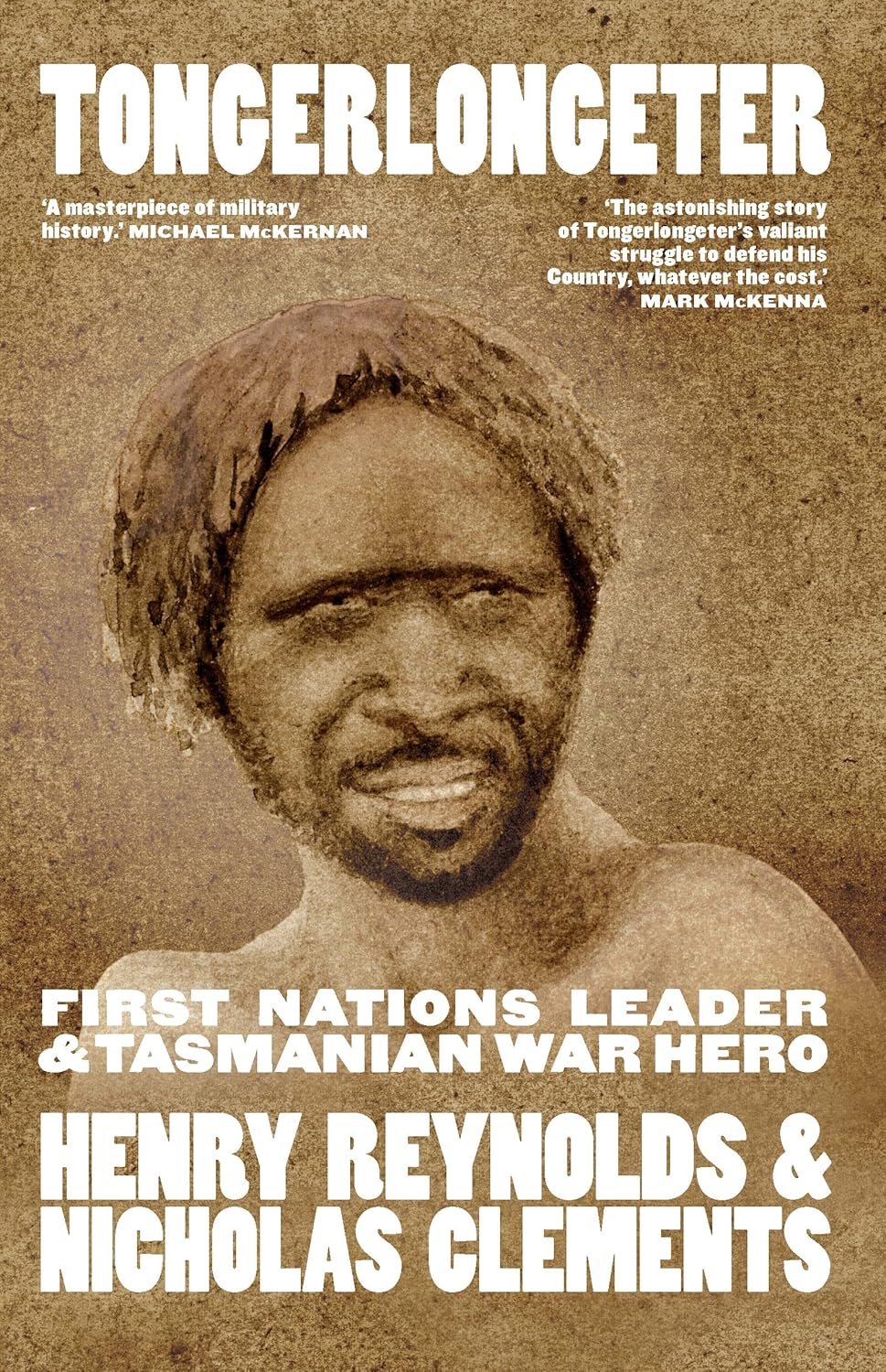Aboriginal and Torres Strait Islander listeners are advised that the following podcast and show page contains information about people who have died.
In this episode of Biographers in Conversation, the renowned historians Dr Henry Reynolds and Dr Nicholas Clements chat with Dr Gabriella Kelly-Davies about their choices while crafting Tongerlongeter: First Nations Leader and Tasmanian War Hero, the biography of the courageous Indigenous warrior, Tongerlongeter.
An epic story of resistance, suffering and survival. Tongerlongeter resurrects a once-in-a-generation leader all Australians can admire.
Tongerlongeter
Australia has no war hero more impressive than Tongerlongeter. Leader of the Oyster Bay nation of south-east Tasmania in the 1820s and 1830s, he and his allies led the most effective frontier resistance ever mounted on Australian soil. They killed or wounded some 354, or four percent, of their Country’s invaders.
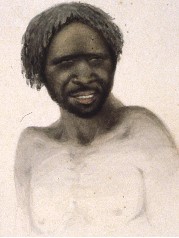
Portrait of Tasmanian Aboriginal resistance leader Tongerlongeter
by Thomas Bock, 1832
British Museum
Born in the late eighteenth century, Tongerlongeter’s early life remains shrouded in historical obscurity. However, his emergence as a leader coincided with the escalating conflict between the Oyster Bay Nation and the encroaching British colonists. Tongerlongeter’s story, like many First Nation’s narratives, has been largely erased from mainstream history.
‘The Tongerlongeter Story’, Nicholas Clements
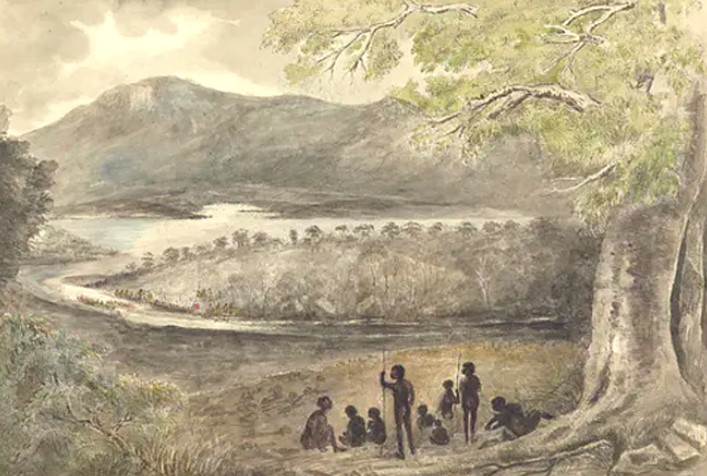
Lieutenant John Bowen and party arriving at Risdon
by Thomas Gregson (c.1860)
Courtesy of the WL Crowther Library
Tongerlongeter’s brilliant campaign inspired terror throughout the colony, forcing Governor George Arthur to launch a massive military operation in 1830: the infamous Black Line. Tongerlongeter escaped but the cumulative losses had taken their toll.
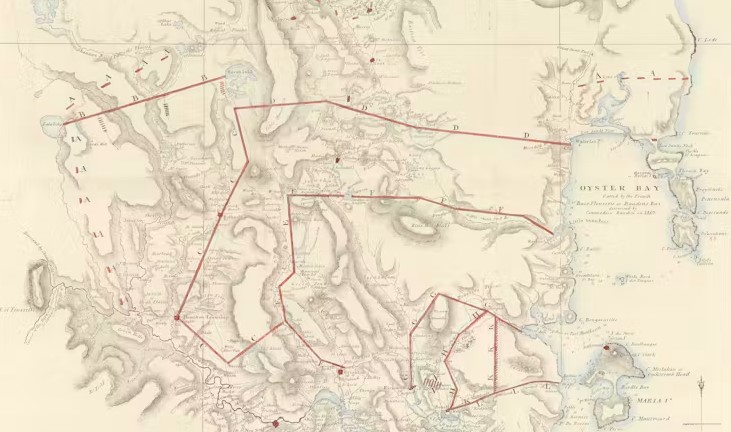
Field plan of military operations against the Aboriginal inhabitants of Van Diemen’s Land, by George Frankland (1830). This retrospective map illustrates the general pattern of divisional movements during the ‘Black Line’ campaign in October and November 1830.
Courtesy of the WL Crowther Library
On New Year’s Eve 1831, having lost his arm, his Country, and all but 25 of his people, the chief agreed to an armistice. Despite his heroic efforts, Tongerlongeter was eventually captured and exiled to Flinders Island, along with many other Tasmanian Aboriginal people. However, his legacy as a fearless leader and a symbol of resistance against colonial oppression lives on. Tragically, almost all the brave warriors who fought alongside Tongerlongeter were killed in action.
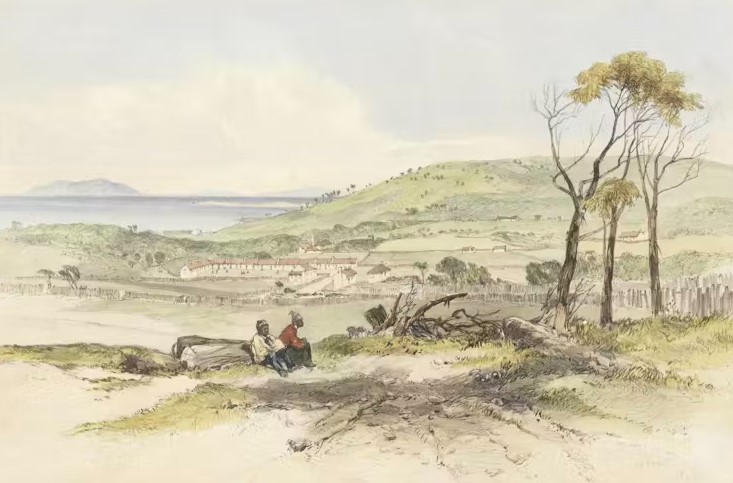
Watercolour of Flinders Island by J. S. Prout (1840s).
Courtesy of the Allport Library and Museum of Fine Arts
In exile on Flinders Island, this revered warrior united most of the remnant tribes and became the settlement’s ‘King’, a beacon of hope in a hopeless situation.
In an astonishing coincidence, King William died on the same day as his namesake in Windsor Castle. Both men were leaders, but that’s where the similarities end. One led the largest and most technologically advanced empire the world had ever seen; the other led a small nation of hunters and foragers from the longest-isolated and least technological society on Earth. One devoted himself to dispossessing millions of indigenous peoples; the other devoted himself to determinedly resisting that dispossession. One died in the comfort of a lavish castle; the other succumbed in a draughty hut on an accursed island far from home. ‘King William’ was just a character Tongerlongeter played so that his people might have a voice. If he had anything in common with the British monarch, it was that his death produced a comparable tide of shock and sorrow, albeit confined to a shrinking settlement on a tiny island at the edge of the known world.
Nicholas Clements
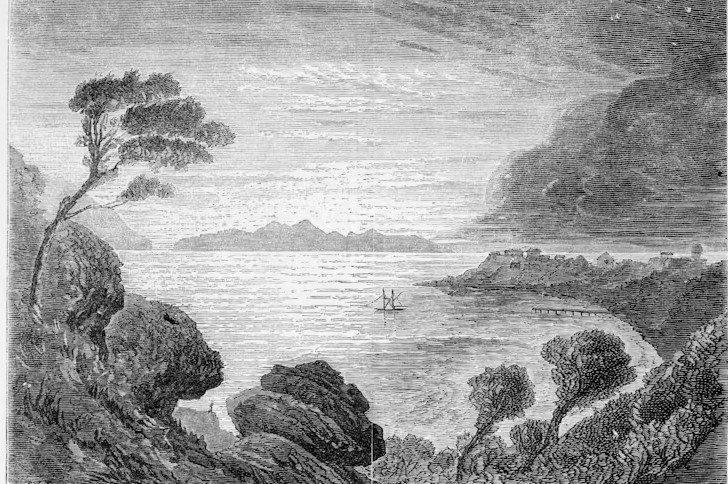
An engraving of Oyster Bay on Tasmania’s east coast (1873).
Published in The Illustrated Australian by Ebenezer and David Syme.
State Library of Victoria
In Tongerlongeter, Henry Reynolds and Nicholas Clements offer extraordinary insights into the historical context of the Black War, the bitter frontier conflict that consumed Tasmania from 1823 to 1831. They highlight the brutality of colonial expansion and the resilience of Indigenous resistance. Henry and Nicholas also examine the ongoing struggle for recognition and justice for First Nations people and emphasise the crucial importance of preserving Indigenous cultures and histories.
The Black War was a brutal conflict that forever altered the course of Tasmanian history. Tongerlongeter emerged as a symbol of resistance, a leader who fiercely defended his land and people against overwhelming odds. His story is a testament to the strength and resilience of Indigenous Australians in the face of colonial oppression.
Henry Reynolds on Revisionist History
In Tongerlongeter: First Nations Leader and Tasmanian War Hero, Henry Reynolds and Nicholas Clements emphasise the crucial importance of acknowledging this history to remember the past and work towards a more just and equitable future. By understanding the injustices of the past, we can begin to heal the wounds they inflicted.
Their book serves as a powerful reminder that history is not merely a collection of dates and events, but a complex tapestry woven with stories of struggle, resistance and resilience. Tongerlongeter’s story is a crucial part of this narrative, a story that must be shared and remembered to ensure the injustices of the past are never repeated.
As Henry Reynolds eloquently stated: ‘The Black War was a tragedy for all involved. But it is also a story of extraordinary courage and resilience. Tongerlongeter’s story is a reminder that even in the face of overwhelming odds, the human spirit can prevail.’

Henry Reynolds on bringing history to life through storytelling
Tongerlongeter is a powerful and timely work that sheds light on a critical period in Australian history. It is a biography that challenges us to confront the uncomfortable truths of the past and work towards a future where Indigenous voices are heard, respected and celebrated.
Praise for Tongerlongeter
A masterpiece of military history.
Michael McKernan, Canberra Times
The astonishing story of Tongerlongeter’s valiant struggle to defend his Country,
whatever the cost.
Mark McKenna, Sydney Morning Herald
Henry Reynolds and Nicholas Clements have worked some powerful historical magic to conjure out of a dark and foggy Tasmanian past the image of a tall, handsome, noble warrior named Tongerlongeter.
Charles Wooley, Weekend Australian
Raw and engaging, Reynolds and Clements have rescued this forgotten hero from obscurity. Despite being stripped of their lore and having British law imposed upon them, Tongerlongeter and his allies fought fiercely for their country. I admire them greatly.
Dianne Baldock, CEO of Circular Head Aboriginal Corporation
Through meticulous research and imaginative reconstruction, Reynolds and Clements have given Tasmania a new hero – Tongerlongeter. Australians should revere him as much as their Anzac heroes – he defended his country to the death.
Professor Peter Stanley, UNSW Canberra
I felt proud reading the story of Tongerlongeter and his epic resistance who, in 19th century words, ‘held their ground bravely for 30 years against the invaders of their beautiful domains’. Reynolds and Clements reveal the guardians of empire in turmoil.
Did we know? We do now.
John Pilger, journalist, writer and documentary filmmaker
Australia puts much into remembering its war dead. The Great War centenary was commemorated more extensively and intensely here than anywhere else.
This is a book about a war hero, his people, and his allies, men and women who fought the longest, in proportion the bloodiest, and among the most consequential wars in Australia’s history. They fought with courage and skill until almost all of them were dead, and even then, the survivors did not surrender. They fought with honour for freedom and love of country.
Why have we never heard of them?
Why can’t we pronounce their names, let alone say them with respect?
A great reckoning must come in Australia. We must be clearer on who was patriot and who invader; who was defending land, Law and people and who cast that aside.
We need to see that both sides lost, one all that life and liberty hold dear, the other the keys to living with this land.
This book does not remedy injustice, but it recognises it. It offers Tongerlongeter, his people and his allies respect, recognition and regret. May it be one of many such books.
Emeritus Professor Bill Gammage
Author of The Biggest Estate on Earth: How Aborigines Made Australia

Dr Nicholas Clements is an eighth generation Tasmanian who has spent most of his life in the Tamar Valley. In addition to being a family man and a keen rock climber, he is a part-time teacher of history, philosophy and psychology. He is also an adjunct researcher at the University of Tasmania, where he completed his PhD on the island’s Aboriginal and early contact histories.
Nicholas’s 2014 book, The Black War: Fear, Sex and Resistance in Tasmania, explored the motivations and experiences of both Aborigines and colonists during that conflict.
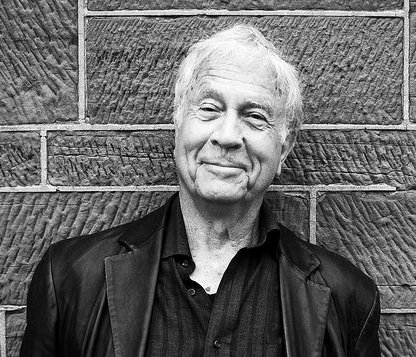
Dr Henry Reynolds is one of Australia’s most recognised historians. He grew up in Hobart and was educated at Hobart High School and the University of Tasmania. In 1965, he accepted a lectureship at the University College of Townsville (now James Cook University), which sparked an interest in the history of relations between settlers and Aboriginal people.
In 2000, he took up a professorial fellowship at the University of Tasmania. His pioneering work has changed the way we see the intertwining of black and white history in Australia.
His books with NewSouth include The Other Side of the Frontier (reissue); What’s Wrong with Anzac? (as co-author); Forgotten War, which won the Victorian Premier’s Award for Non-Fiction; Unnecessary Wars; This Whispering in Our Hearts Revisited and most recently Truth-Telling: History, Sovereignty and the Uluru Statement.
Media Commentary
Friday essay: Tongerlongeter — the Tasmanian resistance fighter we should remember as a war hero, The Conversation, Nicholas Clements
Tasmania’s Black War: a tragic case of lest we remember? The Conversation, Nicholas Clements, 24 April 2014
Tasmanian war hero Tongerlongeter, ABC Radio National, Late Night Live, 27 July 2021
Additional Reading
Helen B. Taussig, MD, 1898-1986
The Changing Face of A Strong Woman
Media Coverage
Pediheart Podcast, The extraordinary life of Professor Helen Brooke Taussig, with Robert H. Pass, MD.
Guest post, They Called Us Girls newsletter.
WYPR 88.1 Baltimore Midday with Tom Hall.
Washington Independent Review of Books with Laura Fisher Kaiser.




